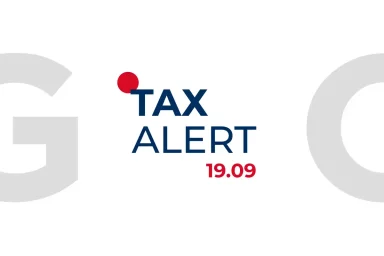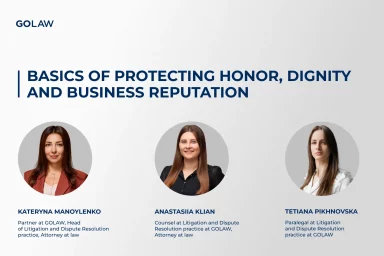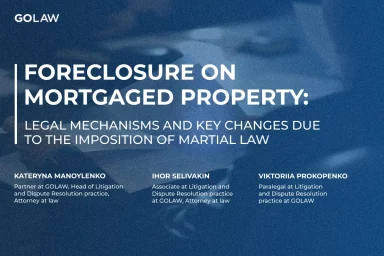The state’s mistake is not your burden
Contents
There is one simple but fundamental rule in relations between citizens, businesses, and the state: if the state has made a mistake, it has no right to correct that mistake at your expense if you have acted honestly and in good faith. These are not just nice words, but a real legal position that has been confirmed by both the European Court of Human Rights (ECHR) and the Supreme Court.
Why is this important right now?
In times of war, reforms, and constant change, the risk of bureaucratic errors on the part of the authorities only increases. Somewhere, an official did not have time, somewhere he made a mistake, somewhere he applied the law incorrectly. At the same time, citizens and businesses cannot be burdened disproportionately for such mistakes. The key point is that this risk should be borne by the state. If you acted in good faith, relying on official documents/decisions, and complied with the requirements established by law, you are protected.
What is the principle of good governance?
In dry legal language, it means that the state must act:
- in a timely manner;
- predictably;
- honestly;
- within the law.
This rule is not just about “official ethics.” It is a legal standard by which courts assess whether the authorities acted on the basis of, within the limits of, and in the manner prescribed by the Constitution and laws of Ukraine.
Thus, back in 2009 (decision of April 16, 2009, No. 7 rp/2009), the Constitutional Court of Ukraine concluded: “if human rights have arisen on the basis of a decision by an authority, and the person is opposed to their change or abolition, the authorities cannot simply override the situation. This is a guarantee of stability in social relations.”
What does the Supreme Court say?
The Supreme Court has repeatedly emphasized:
- the risk of error by the state lies with the state itself;
- if a law can be interpreted in different ways, the interpretation in favor of the individual shall prevail;
- rights acquired in good faith cannot be taken away simply because an official once made a mistake.
For example, the Grand Chamber of the Supreme Court, in its ruling of May 14, 2025, in case No. 466/2086/14-ц, explicitly stated: “[…] The need to correct an old ‘mistake’ should not disproportionately interfere with a new right acquired by a person who relied in good faith on the legality of the actions of a public authority. The risk of any error made by a state authority should be borne by the state itself, and these errors should not be corrected at the expense of other third parties […]”.
European approach
The ECHR in the case of Rysovsky v. Ukraine formulated its position even more strictly: “The principle of ‘good governance’ should not, as a rule, prevent public authorities from correcting accidental errors, even those caused by their own negligence […]. On the other hand, the need to correct a past “mistake” should not disproportionately interfere with a new right acquired by a person who relied on the legitimacy of the good faith actions of a public authority […]. In other words, public authorities that fail to implement or comply with their own procedures should not be able to benefit from their unlawful actions or avoid fulfilling their obligations […]”.
Therefore, the state can correct its mistake, but not at the expense of violating the rights of a bona fide citizen. At the same time, if the right has already been granted and the person acted honestly, compensation or other redress must be paid in the event of its revocation. Similar conclusions were reached by the ECHR in the cases of Gashi v. Croatia, Grafov v. Ukraine, and Kryvenky v. Ukraine.
Real examples from Ukrainian court practice
- “Revocation of fuel trading licenses: state liability for its own procedural errors” case No. 460/13337/23
A business entity obtained licenses for retail fuel trade from the tax authority after submitting all the documents required by law. A few months later, the licensing authority decided to revoke these licenses, citing the absence of information in the state register about the commissioning of the facilities.
The court found that the facilities were factory-made modular gas stations, for which the law does not provide for any commissioning procedure. The regulatory authority did not prove any violations or submission of inaccurate data.
The court ruled that the decision to revoke the licenses was unlawful, emphasizing that if the entity acted in good faith and complied with all legal requirements, the state had no right to revoke the granted right due to its own procedural errors. The risk of such an error lies with the state.
- “Cancellation of registration documents for reconstruction: violation of the principle of good governance” case No. 640/5473/20
The courts found that the owner of a residential building and land plot had reconstructed the facility on the basis of a duly registered notification of the start of construction work and a declaration of readiness for operation issued by the state architectural and construction control authority. The Department, citing the absence of a sample of previously designed networks, without conducting the inspection required by law and without establishing signs of unauthorized construction, canceled the aforementioned documents. The courts of first and appellate instances concluded that such actions violate the requirements of legality, proportionality, and good faith, since:
- the facility complies with the intended purpose of the land plot;
- the project documentation is approved and valid;
- the urban planning conditions and restrictions have not been canceled;
- the absence of sampling is not a sign of unauthorized construction.
Taking into account the principle of good governance, the courts found the Department’s order to be unlawful and revoked it as having been issued outside the scope of authority and without due legal procedure.
What does this mean for you?
Good faith is key. If you acted honestly, using official decisions or documents, the state cannot take away your rights without compensation. The courts are on your side, both Ukrainian and European. An official’s mistake is not your problem. The risk and consequences are on the state.

Tetiana Opanasiuk
Lawyer, Attorney
- Contacts
- 31/33 Kniaziv Ostrozkykh St, Zorianyi Business Center, Kyiv, Ukraine, 01010
- t.opanasiuk@golaw.ua
- +38 044 581 1220
Get in touch
To get a consultation, please fill out the form below or call us right away:Sign up to be aware
New achievements are inspired by information. GO further, don’t miss out GOLAW news and legal alerts
Our expertise
-
- Energy and Natural Resources
- Antitrust and Competition
- Banking and Finance
- Compliance, Corporate Governance and Risk Management
- Corporate and M&A
- Criminal and White Collar Defence
- Defense in Anti-corruption procedures and regulations
- Labor and Employment
- Natural Resources and Environment
- Government Relations (GR)
- Insolvency and Corporate Recovery
- Intellectual property
- International trade
- Legal support of business and private Сlients in Germany
- Litigation and dispute resolution
- Private clients
- Real Estate and Construction
- Restructuring, Claims and Recoveries
- Martial Law
- Tax and Customs
-
- Agribusiness
- Aviation
- Chemical industry
- Engineering, Construction and Building Materials
- Natural Resources and Environment
- Financial institutions
- IT and AI
- Industry and manufacturing
- Healthcare industries, Life sciences and Pharmaceuticals
- Media, Entertainment, Sports and Gambling
- Retail, FMCG and E-Commerce
- Transport and Logistics
We use cookies to improve performance of our website and your user experience.
Cookies policy
Cookies settings







